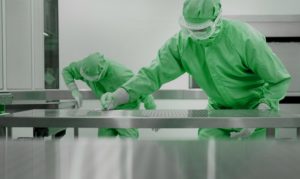Disinfectants are an important tool in preventing the spread of harmful bacteria and viruses, especially in healthcare settings and in our homes. However, it is important to understand that the residues left behind by these disinfectants can also have negative consequences if not properly managed.
One reason why disinfectant residues matter is because they can lead to the development of antibiotic-resistant bacteria. When disinfectants are used frequently and in high concentrations, they can kill off weaker bacteria while allowing the stronger, more resistant bacteria to survive and multiply. This can create a population of bacteria that is resistant to the disinfectant, making it less effective in killing harmful pathogens in the future.
In addition, disinfectant residues can also have negative effects on human health. Some disinfectants contain chemicals that can be harmful if ingested or if they come into contact with the skin or eyes. These chemicals can cause irritation, allergies, and other health problems, especially in individuals who are sensitive to these substances.
Furthermore, disinfectant residues can also impact the environment. When disinfectants are washed down the drain or disposed of improperly, they can enter the water supply and harm aquatic life. Some disinfectants can also release volatile organic compounds (VOCs) into the air, contributing to air pollution and potentially harming human health.
To minimize the negative effects of disinfectant residues, it is important to follow proper usage and disposal guidelines. This includes using disinfectants in the recommended concentrations, allowing sufficient contact time for the disinfectant to work effectively, and properly rinsing surfaces after disinfection. It is also important to use disinfectants that are safe for both humans and the environment, like a natural disinfectant E-storm Solutions Hypochlorous acid HOCL and to always read and follow the instructions on the product label.
In conclusion, disinfectant residues matter because they can contribute to the development of antibiotic resistance, have negative effects on human health, and harm the environment. By understanding the potential risks associated with disinfectant residues and taking steps to properly manage them, we can ensure that disinfectants continue to be an effective tool in preventing the spread of harmful pathogens while minimizing their negative impacts.
Now you can clean & kill 99.9% of germs without toxic chemicals. BS - approved. Sign up to get 10% off.